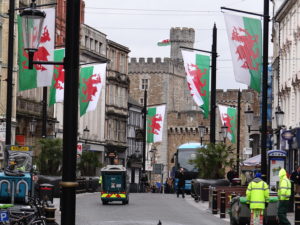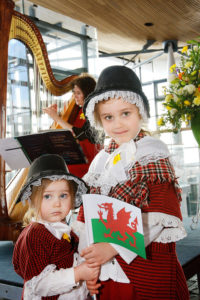Nia Thomas
“Gwnewch y pethau bychain mewn bywyd.” / “Do the little things in life.” – Dewi Sant / Saint David
Saint David’s Day – Dydd Gŵyl Dewi Sant – celebrates Saint David, the patron saint of Wales, on the 1st March every year. The date commemorates St David’s death in 589 AD and has been celebrated in Wales since Pope Callixtus II canonised St. David in the 12th century.
Who was St. David?
Born in Caerfai in south west Wales, St David (Dewi Sant in Welsh) founded 12 Celtic monasteries across Wales, including Glyn Rhosyn in Pembrokeshire, where St David’ Cathedral still stands today in Britain’s smallest city, the eponymous St. David’s.

There are many stories of miracles associated with St. David. One of the most famous stories states that, when speaking to a large crowd, someone shouted out “We won’t be able to see or hear him”. Following this, the ground Saint David stood upon was said to rise into a hill so the whole crowd could hear him. Saint David is also credited with restoring a blind man’s sight and bringing a child back to life.
How is St. David’s Day celebrated?
Around Wales, Saint David’s day parades take place – the largest being in the country’s capital, Cardiff. The parades are intended to be a complete celebration of Welsh heritage and culture. A concert is also held in St David’s Hall in Cardiff with Welsh song performances from the BBC National Orchestra and Chorus of Wales.
Schoolchildren also take part in celebrations for Saint David’s day, usually culminating in school concerts known as an eisteddfod, where musical performances and dances are the main activities.

Young girls also typically wear traditional Welsh costumes to school, consisting of a long woollen skirt, apron, blouse, shawl and a Welsh hat. Though in older years, Welsh rugby or football tops are also worn.
Traditional Welsh foods like cawl (lamb stew), Welsh cakes and bara brith (tea-soaked fruit cake) are also eaten.
Celebrations take place outside of Wales too. Students at the University of Exeter at the St David’s accommodation take part in an annual beer race, while Disneyland Paris hosts a St David’s Welsh Festival.
Should St David’s day be a national holiday?
Wales is the only nation in the United Kingdom without the power to decide its own bank holidays. While St. Patrick’s day is a recognised bank holiday in Nothern Ireland and St Andrew’s Day is a recognised similarly in Scotland, St. David’s Day is yet to be honoured in the same way.
In December, the UK government rejected calls to make it so, claiming that too many people commute from Wales to England and vice versa for the notion to be feasible. Figures estimate that, in 2019, 98,500 people commute out of Wales, while 42,700 commute in to Wales for work.
Small business minister, Paul Scully, said: “While we appreciate that the people of Wales want to celebrate their patron saint, more people work across the English/Welsh border than across the English/Scottish border.”
“This closer degree of integration could cause greater business disruption. I few had separate bank holidays in England and Wales, the impact on both employees and businesses is difficult to predict.”
Responding in January, Gwynedd council (a county in North Wales) authorised a holiday for all staff on 1 March to commemorate “the national importance and status of St David’s Day”.
Plaid Cymru councillor Nia Jeffreys argues that the move sends an “important message” to Westminster who ignored cross-party support for the bank holiday within the Senedd.
Jeffreys continued: “It is a national disgrace that in Wales we cannot choose and identify our own significant events, be they culturally, linguistically or of importance to our own heritage.”
“Westminster refuses to devolve to power to the Welsh Government to decide on this fundamental right.”
There is also overwhelming public agreement on the matter – a poll found that 87% of people in Wales want a St. David’s Day bank holiday, while 65% would sacrifice an alternative bank holiday to do so.
Critics of the movement for a public holiday in Wales berate the economic consequences of such a decision. Reports estimate that the move will cost Gwynedd council £200,000. Though with the increased tourism and boosts to hospitality and retail St. Patrick’s Day brings to Ireland, these are easily disputed.
Featured image courtesy of Chris Linnett via Unsplash. Image license found here. No changes were made to the image.
